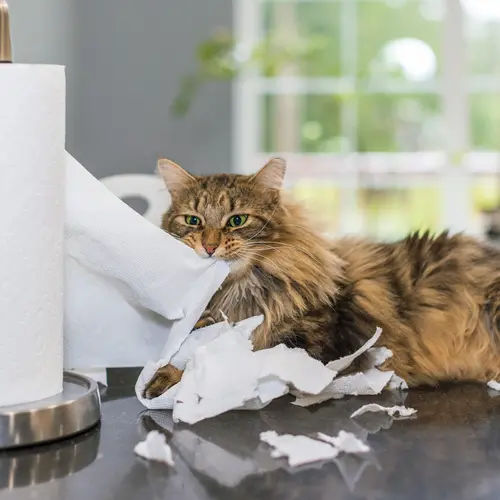A reverse sneeze in cats is a way they try to clear out irritants from their mouth or throat. It can look and sound a lot like choking, though, so watch to make sure your pet returns to normal within a few seconds. This tendency is not typically dangerous or contagious, but you may want to check with your vet if you're worried that reverse-sneezing cats are sneezing a bit too often and for too long.
What Is a Reverse Sneeze in Cats?
During a regular sneeze, cats force air out through their noses to clear out an irritant such as dust. In a reverse sneeze, the cat sucks air in through its nose to clear irritants. The nasal cavity (the airway that extends down from the nose to the windpipe) connects to the mouth at the back of the throat. When an animal rapidly pulls in air through the nose into the windpipe, doing so clears out that area at the back of their throat.
What Does Reverse Sneezing Sound Like?
Reverse-sneezing cats can sound like they're choking, as if something is stuck in the cat's throat. If it's just a reverse sneeze, though, the odd noises should go away quickly—usually within seconds—and your cat should then go right back to their normal behavior. If your cat continues to make choking sounds and you're worried that they're having trouble breathing, call the vet right away.
A reverse sneeze can also sound like wheezing, gagging, snorting, gasping, or honking. What causes that terrible noise? The soft palate is an area at the back part of the roof of your cat's mouth. During a reverse sneeze, the soft palate spasms, making the strange choking sound you hear.
What Does a Reverse Sneeze Look Like?
During a reverse sneeze, your cat will most likely stand still. They might close their eyes and stretch out their neck. Their lips might be drawn back from their teeth, making them look like they're smiling.
Is Reverse Sneezing in Cats Dangerous?
Watching a reverse sneeze can be scary for a pet owner because it looks like your cat is struggling and the noises sound awful. Still, reverse sneezing isn't at all harmful to your pet.
Reverse Sneezing in Cats Causes
Several things can trigger a reverse sneeze:
- Allergens such as pollen
- Irritants like dust
- Bits of grass or weeds a cat accidentally inhaled (or tried to eat!)
- Drinking or eating too quickly
- Excitement
When to Ask the Vet About Reverse Sneezing
An occasional reverse sneeze is normal and nothing to worry about. If your cat is sneezing very frequently, check with the vet. Unless you're seeing other concerning symptoms, reverse sneezing on its own is not a reason to rush to the emergency animal hospital, so call during business hours to make an appointment for your cat.
Try to catch your cat sneezing on video so you can show the vet what the sneezing episodes look like. If your cat is reverse sneezing frequently, the vet may check for conditions such as:
Allergies. Just like humans, cats can develop allergies to pollens, dust, mold, or certain foods. A cat's immune system is sensitive to the allergen and overreacts to it, causing symptoms like itching, sneezing, coughing, vomiting, and diarrhea. Treatment will depend on what the cat is allergic to, what symptoms they are experiencing, and whether they have a seasonal allergy or year-round symptoms. Your vet might suggest a special diet, offer medications, or even provide allergy shots if other treatments don't work.
Asthma.Feline asthma narrows airways in a cat's lungs. Signs include difficulty breathing, coughing or hacking, wheezing, and very rapid breathing. Medications can help treat these symptoms, though.
A foreign body. This is anything that does not belong in your cat's nose, mouth, throat, or windpipe. Cats sometimes accidentally inhale or eat small seeds, bits of grass or mulch, tiny bones, or other objects. This leads to symptoms like coughing and choking. The foreign body must be removed, and the cat may need antibiotics to treat any infection caused by the incident.
In conclusion, remember that reverse sneezing in cats is nearly always harmless and goes away on its own. However, if you feel concerned about how often or how intensely your cat is sneezing, make an appointment for a checkup with your family vet.


